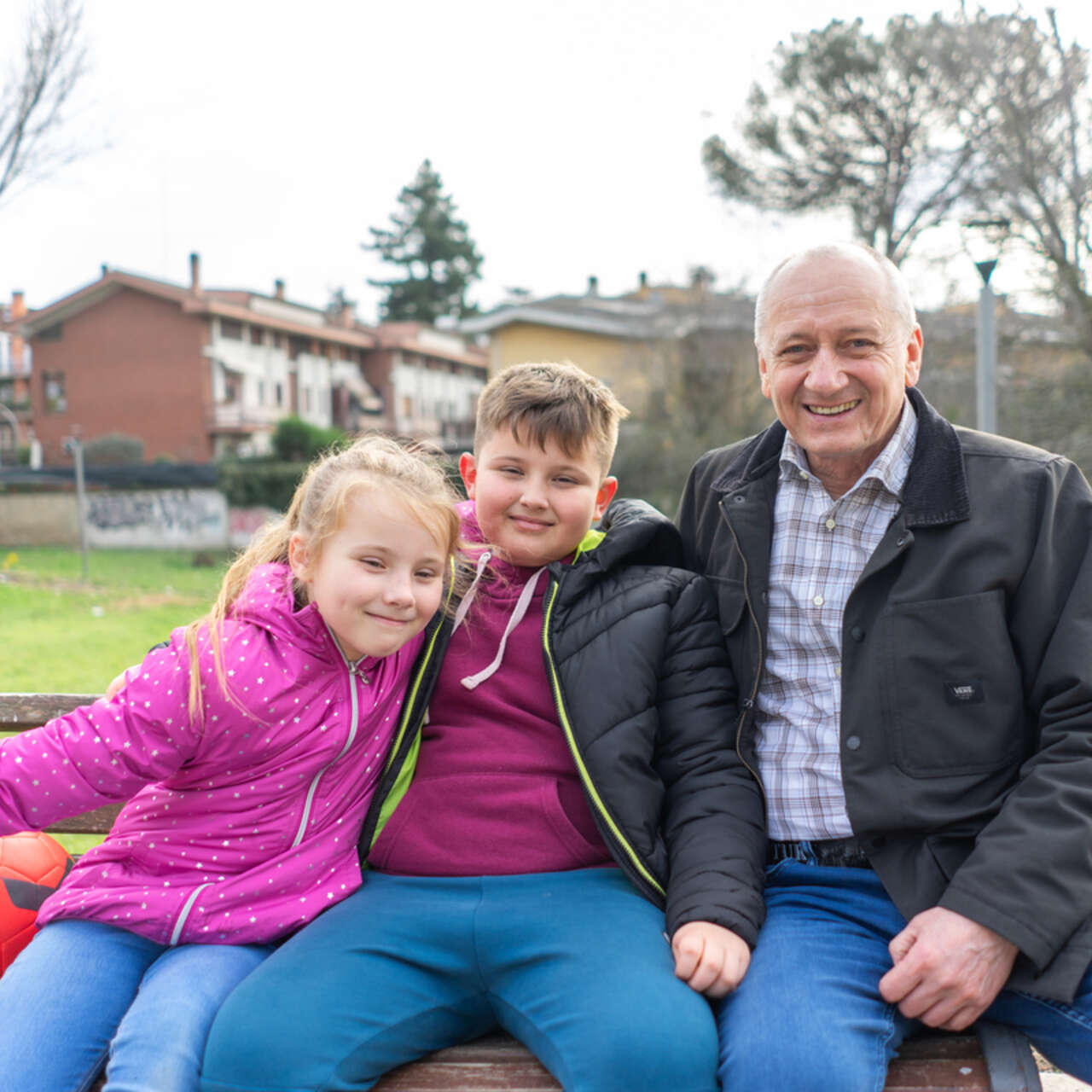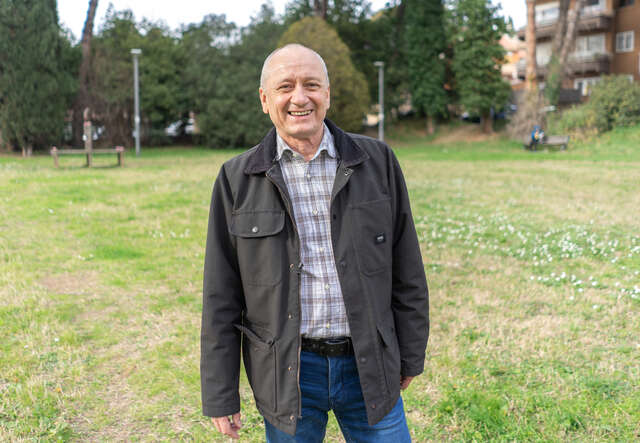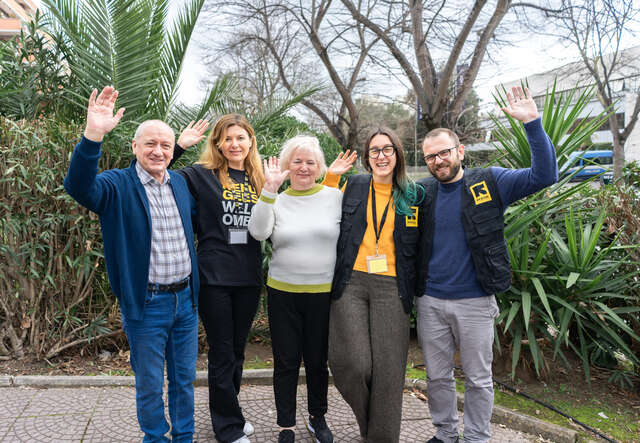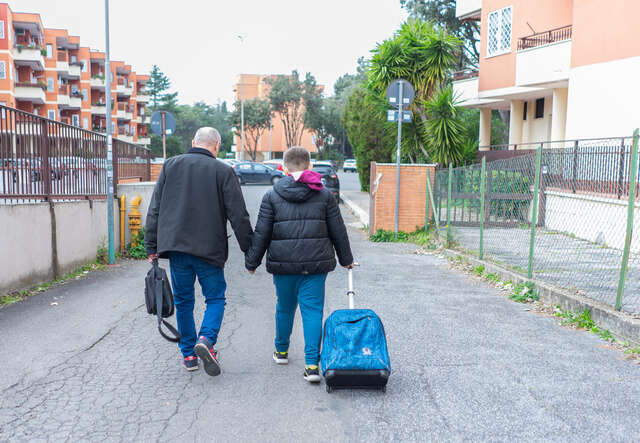
Evacuating Ukraine: Oleksandr’s fight to keep his grandkids safe
67-year-old Oleskandr recounts his fraught journey to flee Ukraine with his wife and two grandchildren, and the subsequent legal battle they endured.

67-year-old Oleskandr recounts his fraught journey to flee Ukraine with his wife and two grandchildren, and the subsequent legal battle they endured.
When the war in Ukraine escalated in February 2022, Oleksandr’s role as a grandfather took on an urgent importance.
His son-in-law was hospitalized with a lung thrombus, keeping his daughter by his side. Meanwhile, Odesa faced bombings, and Kherson, the adjacent region, was already under occupation.
Oleksandr remembers discussing how they could best protect their two children with his daughter and son-in-law. As a disabled veteran and Chernobyl survivor, Oleksandr wouldn’t be drafted into the army and could leave Ukraine.
“The question arose of how to evacuate the children from under the bombs, who could do it. They couldn't. They said: ‘Grandpa, you could’”, he recalls.
Oleksandr couldn't bear the thought of leaving his homeland and family behind, but he knew he had a rare chance at getting his grandchildren to safety. “I didn't plan to leave. But as they said, if something happens to the children, and you could have prevented it and didn't, what will be…”
At first, Oleksandr and his wife brought their two grandchildren to Moldova, hoping for a swift end to the war. However, with escalating conflict, a friend residing in Italy advised them to join her there instead.
Having to travel across several borders and checkpoints to reach Italy, Oleksandr printed a sign to put in the car window, pleading ‘DON’T SHOOT, CHILDREN.’
“I think the sign played a role in being allowed through borders everywhere,” he says. “We came from Moldova to Romania. In Romania at the border, volunteers were already standing. They immediately gave us a sim card to communicate by phone.”
Oleksandr, his wife and their grandchildren came across many people during their journey, including another family who joined them in their car. “Everyone in the car was packed tightly like sardines,” he recalls. “We spent nights at gas stations. And the money we had was about five hundred dollars. And I managed with that money until Slovenia.”
During his journey, Oleksandr was touched by the compassion and generosity of unfamiliar faces. While in Slovenia, a volunteer fluent in Ukrainian escorted them to a hostel and offered 100 euros to help refuel their car. In Italy, a person saw their Ukrainian license plates and also offered to pay for their gas.
Once they arrived in Italy, Oleksandr and his family soon encountered obstacles. After spending one night in a monastery, they were taken to a collection point, where they underwent medical examinations and were accommodated by the civil defense. As they went to register for permits at the immigration center, the border officials were resistant to providing permits for the children.
Although Oleksandr possessed all the necessary documents authorized by their mother to look after Sasha and Natasha, these papers were not considered valid in Italy. “They said "no" to the children. I asked, ‘How? Here's the power of attorney, the children are with us. I'm their grandfather.”
However, Oleksandr was informed that they do not recognize grandparents as legitimate caregivers and that the documentation would have to be transferred to a different organization.

Physically and mentally drained, the family found accommodation provided by the Government in a hotel in Rome hosting other Ukrainian refugees. Oleksandr and his wife began a grueling six-month process, involving several court hearings, to prevent their grandchildren from being taken from them and put in an Italian orphanage. “Every day we would worry that they would come today and take the children,” Oleksandr says.
Assisted by case workers from another organization, he obtained legal assistance, including lawyers. Oleksandr reminisces about appearing before the guardianship council and a tribunal with his wife, where they collaborated with a lawyer to present their family's circumstances to a judge.
Thankfully, with the help of volunteers throughout, the grandparents were able to convince the judge that they should be allowed to take care of the children.
With Oleksandr's daughter now in Italy, they are actively pursuing the transfer of guardianship to her, adding another layer of complexity to the already challenging legal procedures. “We are turning to the IRC and they found us a pro bono lawyer. The lawyer prepared all the documents again and submitted them again.”
Oleksandr continues to reside in a hotel room with his wife and children, where the IRC has provided extensive support to the family, such as assisting with finding after-school activities for the kids and providing Oleksandr with a list of medical professionals to address his healthcare needs.

Despite enduring numerous challenges, Oleksandr and his family have established a weekly routine that they follow together. He takes great joy in his role as a grandfather, accompanying his grandson, Sasha, to football practices and ensuring both children attend swimming lessons. Additionally, he assists them in their online studies with a Ukrainian school to help ensure that they don’t forget the Ukrainian language.
“We do everything. We walk with them in the playground, on weekends we go with them to the sea,” he explains. Yet, they persist in longing for home, diligently checking the news on Ukraine daily, anxiously awaiting updates on whether their house remains intact or has fallen victim to bombings.

The IRC has been providing direct support to refugees, asylum seekers, and migrants in Italy who are facing immense hurdles in the integration process. Since 2017, the IRC has been working with local organizations, national authorities, and institutions to improve the asylum system and humanitarian conditions in Italy.
With services in Milan, Turin, Trieste, Rome and Palermo, the IRC in Italy works around the clock to ensure rights are protected, women and girls are safe from harm and people on the move can meet their basic needs.